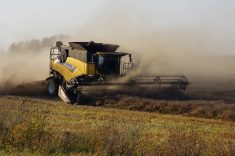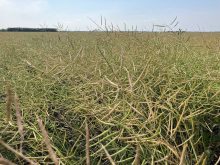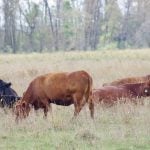Rather than send out a canola variety with a single source of resistance against clubroot — especially the disease’s most recent pathotype — Agrium’s CPS division has stacked several sources into the new hybrids it’s sending for testing this summer.
Crop Production Services on Monday announced its “next generation” of Argentine canola hybrids shows “high levels of resistance” against clubroot pathotype 5x — a type found in 2012 in some canola fields in the Edmonton area, after plants from other resistant canola varieties reacted to it.
The new canolas also show resistance to previously known clubroot pathotypes 2, 3, 5, 6 and 8, CPS said, citing “preliminary data” from its research and development (R+D) collaborations.
Read Also

Pea, lentil outlooks have some positive signals – Penner
As pulse growers consider what to plant this spring, Chuck Penner of Leftfield Commodities Research said there is some optimism in the Canadian pulse market. Penner gave a presentation at the Saskatchewan Pulse Growers meeting in Swift Current on Feb. 4.
There hasn’t yet been a genetic offering that provides high levels of resistance to emerging new pathotypes, including 5x, CPS said, noting “intermediate” resistance is already on the market. Canterra Seeds earlier this year rolled out CS2000, a hybrid billed as having intermediate — that is, 30 to 69 per cent — reaction to 5x.
CPS’ announcement comes as canola experts in Alberta confirm a “breakdown” of clubroot resistance in that province, in varieties otherwise rated “R” (resistant) against the disease.
The Canola Council of Canada said pathotypes capable of causing high levels of disease in resistant canola cultivars were present in 16 of 27 fields investigated clear across the province.
A clubroot pathogen isolated from “many” of those fields was found to be virulent on all clubroot-resistant cultivars, the council said.
Experts suspect there may be “multiple” pathotypes causing such a loss of function of clubroot resistance, the council added.
The new canolas, CPS said, come from “multi-year” research in tandem with the University of Alberta and Agriculture and Agri-Food Canada, which turned up “multiple unique gene sources” of resistance against clubroot 5x.
Hybrids with the resulting gene stacks have been screened against spores of all known clubroot pathotypes, according to Bruce Harrison, CPS Canada’s director of R+D in Saskatoon.
“CPS has been a very good collaborator for us,” AAFC researcher Gary Peng said in the company’s release Monday. “They provided us with the source material from their germplasm collection. We’ve identified the gene and have developed the molecular marker to drive efficiency into breeding for this trait.”
Some of those hybrids will go into private data co-op testing this year, Harrison said, with the aim of picking up interim registration in February 2016.
“Less prone”
In the meantime, Prairie canola growers will want to continue to try to gauge what they have in their fields, he said, emphasizing there’s not going to be one silver bullet against clubroot.
Preventing the disease from spreading, he said, will involve a combination of resistant hybrids, sufficiently long crop rotations and field equipment management.
CPS expects the work on clubroot resistance to be a “lifelong journey” for canola breeders. The pathotype that’s been seen beating R-rated canolas, now categorized as 5x, may not turn out to be so simple to characterize, Harrison said.
“We kind of view clubroot like we do blackleg,” he said, in that the disease’s pathotypes will continue to change and “there’s not going to be a ‘eureka’ moment.”
That said, canola breeders are taking a similar multigenic approach to blackleg resistance. For example, Canterra on Tuesday rolled out CS2100, a new multigenic hybrid it expects will be “less prone to breakdown by new races” of blackleg.
Canterra said its new long-season Genuity Roundup Ready hybrid has shown “broad-spectrum resistance” to the blackleg pathotype groups 2,3,4 and T. CS2100 is expected to be available for the 2016 growing season. — AGCanada.com Network















